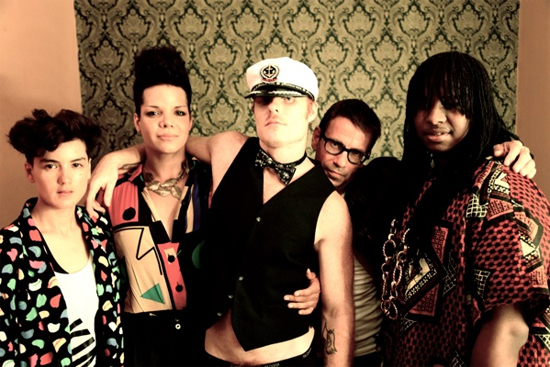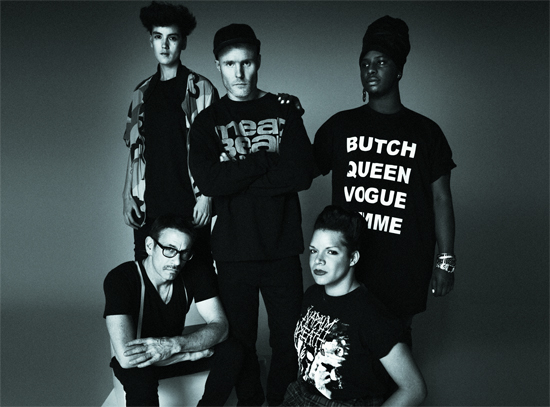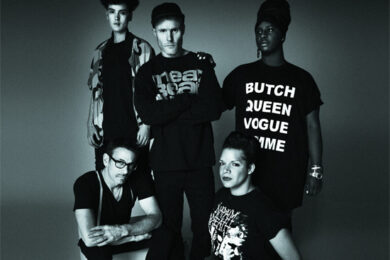Andy Butler sounds fucked. I can barely understand what he’s saying when I phone him up on his New York number at midday his time. Out of this barely coherent croak I manage to decipher "coffee" and "phone back in ten minutes". When I call back he’s only marginally more comprehensible and if I didn’t know better I’d say he’d only just caught my phone call after strolling in through the door that morning after some particularly bracing mid-week clubbing session. At one point I start having to shout to make myself heard because he’s pouring himself a bath.
But this is a good thing right? There’s too much dance music being made by people who either don’t go clubbing or if they do, don’t dance when they get there. A few days later when I transcribe the tape I feel slightly guilty: even though partially inaudible, everything that he says makes stone cold sense.
We’re talking about Hercules And Love Affair’s second album, Blue Songs. Like our conversation, it doesn’t make much sense on first listen. When the group released their self-titled debut on DFA, co-produced by Tim Goldsworthy and Butler, they became temporary critical darlings. Given that the divine-voiced Antony Hegarty had been a torch singer in a bathhouse earlier in his career, his recasting as a wounded disco diva in ‘Blind’ was phenomenal. It was easily the single of the year and the album wasn’t far off pole position either.
However, it’s hard to parse any sense from the disparate collection that Blue Songs presents at first. ‘Painted Eyes’ lowers you in gently with some Moroderesque electro bass, enhanced by underlit dancefloor strings. But second song ‘My House’ (like several others beside) does initially confuse. Out of its nasty electrical hiss and crackle, though, lurches some muscular and brutish jacking house that would make total sense booming through a big rig. The third song ‘Answers Come In Dreams’ is another curveball, again coming on all early-80s electo funk. And that’s before we get to the Balearic and sultry ‘Blue Boy’, the Talk Talk-esque ‘Blue Song’ and the straight up techno of ‘Visitor’.
For quite obvious reasons a lot of attention has been focused on Antony’s no-show (also gone from the line up is former vocalist Nomi Ruiz). For less charitable reasons there has been a lot of speculation about why the album hasn’t come out on DFA, with a lot of people presuming that this has something to do with Goldsworthy’s irritable departure from his role co-running the label with James Murphy.
What I do know as fact however is that I love this record. I’m just glad I spent the time trying to understand what it was saying.
Dance music changes at a phenomenal pace and most producers of house or disco music have to deal with the fact that styles change between albums. But for Hercules And Love Affair, this fact has been accentuated by the fact that you’ve changed labels and line-up on top of that since your debut. How have you coped with all of this?
Andy Butler: Well, we didn’t have much choice in the situation but it wasn’t very frustrating though, it felt quite natural. It felt more like, ‘Ok, we’ll we’d better change this and that.’ It didn’t feel… as tumultuous as it might look from the outside or as people have made it sound. The label change was very basic. EMI had a shitty year so DFA struggled because of it and they struggled to hold onto us because of it. That’s the end of the story.
Change of line up? People are always going to be changing. Antony was never going to be there permanently. Nomi and everyone had to go and do their own thing. So it was kind of a natural evolution and led to us focusing more on techno, classic house, our roots: where we came from. So the first time we played something akin to a live show [as Hercules mark II] was when we were in Australia. We rented out a studio and basically left everyone at the beach while we performed one of our songs without anyone else. Just machines and synths and vocals and it sounded a lot more like traditional house music. It was a lot less wonky, live disco and it felt like a great change. It has been a real success so far and I feel like the shows have had 20 times more energy than they had before. It’s more cohesive as a live show. You’re going to hear water for a second… [runs bath]
Did you say you left everyone else on the beach?
AB: Yeah.
That sounds idyllic. Do you think this set up helped give you a Balearic vibe. A bit of a sun-dappled thing going on?
AB: Being near the sea in Australia? No. I don’t know why this new incarnation of the band happened then… well, I do, it was because the old one was done. The old incarnation of the band was trombone, trumpet, bass, drums, keyboards… this was at the end of that tour and we just took the opportunity when we didn’t have any shows to play just to go into the studio. It was based on freedom because we had nothing else to do. We wanted to put our songs into a more techno, more live style.

Would it be fair to say generally speaking that you’ve moved more away from the traditions of New York and more towards the traditions of Chicago?
AB: I’d say that I’ve moved as far away as I can from any city at all. Any specific city you care to mention. I’ve left New York. I think it’s funny how people have hailed the first record as a catalogue of New York references when I had other things inspiring me, say from Patrick Cowley to Giorgio Moroder to San Francisco… and New York disco. Maybe on certain songs for sure there are homages to Chicago and jacking house and other traditions. A lot of this was written with Shaun [Wright] in mind as he is a Chicago native and he grew up doing all the jooking, footwork and listening to the radio DJs and soaking up house culture but the rest of it I have been trying to get away from specific scene and musical references. This is very unique but unclassifiable classic house.
Yeah, I do think it covers a lot of ground. It is a lot more ambitious. Do you think a lot of US critics would have preferred you to just turn in H&LA II rather than progressing?
AB: Yeah, of course. I think people didn’t expect me to write, for example, slower music. Perhaps they were surprised by that and the fact we’ve used different instruments. I don’t know, maybe they think that I’m just this cheesy revivalist who is supposed to just provide these moments in time with every record he puts out. They’d prefer it if I was saying something like: ‘Here’s Volume III, it references ABBA! Now here’s deep funk! Now here’s acid jazz!’ I’m not going to do that. I’m going to do what I do, which is write music. Also, this album isn’t a strictly dance album but neither was the first either. The first record was about being able to be heard in different environments. And I want the same thing for this album. I don’t want to be pigeonholed or limited to one kind of music or a limited number of instruments we can play on. There are more than a limited number of tempos I can play in and there are more than a limited number of emotions I can experience.
Well, I do think people who give it a ‘deep’ listen or play it on headphones multiple times, will be rewarded with a much more emotionally complex album and like you said, one that suits different environments.
AB: Well emotionally there were some very mature subjects on the first album. ‘Time Will’ was about my relationship with my mother. ‘Blind’ was about a young person having a hard time coming of age, trying to find a missing piece to a puzzle. But yeah, I guess there is more introspection on this album.
Hercules and Love Affair – My House by The Drift Record ShopIn some ways the album builds towards a jaw-dropping finale: the cover of ‘It’s Alright’, which I guess most people will know, even if they don’t know where from or don’t necessarily know the original. When did you first hear this song and which version was it?
AB: I first heard it when I was 15 and it was the Sterling Void version. I heard it out at a nightclub and they always used to end on a couple of classic songs and one of them was always ‘It’s Alright’. The DJ used to mix an a capella over a version of ‘Belfast’ by Orbital, so it was unique to the club. So I first heard it when I was 15 and finally found out what it was when I was 17 and went to a record shop to buy it. The guy who sold it to me was amazing. He brought a lot of interesting culture to Denver where I grew up but a few years ago he threw himself in front of a train. So I wanted to re-do ‘It’s Alright’ as like a memorial, and to acknowledge what he had given me in a concrete way.
How did you come to work with Kele?
AB: Kele was trying to get away from New York more and more. I was going out and everyone was like, ‘Kele, Kele, Kele… do you know Kele?’ And eventually a friend said, ‘You guys should really know each other.’ So my manager reached out and got his number. We went out for lunch and it was a bit odd at first but we realised we knew all the same people in Chicago. It was pretty funny. We got on famously, so we decided to work together.
You obviously listen to a lot of different styles of music. What is the common thing that you’re always looking for when you’re producing and consuming music?
AB: Ahhhhhh. Some people don’t want other people to think that they’re taking themselves too seriously but I’d sooner they take themselves too seriously than just put on a schtick. I like pure, strong emotion and I like this to be unadulterated. I like sincerity. I like oddness and awkwardness. So I like things that don’t fit in culturally. I find those things to be more provocative.
What are the main problems with club music being made in 2011?
AB: I think most songs are too long. People don’t pack enough material into their songs. People don’t challenge themselves to write real songs. There are no narratives being formed out of music any more. A lot of club music is tepid and arch. And by this I don’t mean we need huge drum rolls, sirens and rockets going off but I do think we need chord changes, substance and depth. We need lyrical content that has been thought about. We need craft and song writers who take this craft seriously. People often stop short of creating great things. Do you know what I mean? They’re satisfied with what they’re doing. People need to start pushing themselves again.
Hercules and the Love Affair – Painted Eyes by smithblogsatlantaHercules And Love Affair are on tour now:
02-17 Madrid, Spain – Heineken
02-18 Lisbon, Portugal – Lux
02-19 Barcelona, Spain – Bikini
02-22 Zürich, Switzerland – Abart Club
02-24 Florence, Italy – Tenax
02-25 Munich, Germany – Stadtmuseum
02-26 Hamburg, Germany – The Docks
02-28 Cologne, Germany – Club Bahnhof Ehrenfeld
03-02 Stockholm, Sweden – Debaser
03-03 Berlin, Germany – Berghain
03-04 Leipzig, Germany – Conne Island
03-05 Amsterdam, Netherlands – 5 Days Off Fest
03-06 Brussels, Belgium – Botanique
03-08 Frankfurt, Germany – Offenbach
03-09 Paris, France – La Machine
03-10 Brighton, England – Digital
03-11 London, England – Village Underground
03-12 Leeds, England – Favershame
03-13 Liverpool, England – Mojo
03-14 Sheffield, England – Foundry
03-16 Bristol, England – Metropolis
03-17 Dublin, Ireland – Button Factory
03-18 Manchester, England – Fac 251
03-19 Glasgow, Scotland – The Arches
03-20 Aberdeen, Scotland – The Tunnels



